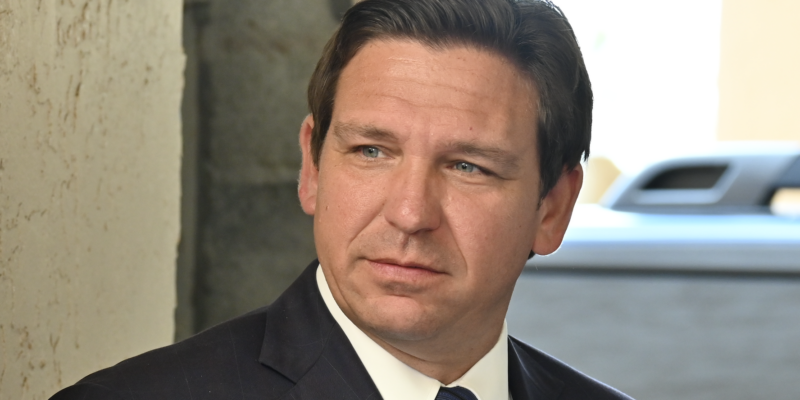Florida Gov. Ron DeSantis could be on the verge of causing himself a historic and irreparable self-inflicted political wound if he signs into law a controversial legislative measure targeting Free Speech and media outlets.
If he signs this bill, Gov. DeSantis's long-standing conservative and constitutional bona fides could very well be called into question.
The measure, “HB 991 - Defamation, False Light, and Unauthorized Publication of Name or Likenesses,” filed by conservative State Rep. Alex Andrade, targets media companies of all sizes and ideological persuasions, and media personalities like some of the very “influencers," including John Cardillo, Benny Johnson, Lisa Boothe, and Dave Rubin, who he surrounds himself with.
Let’s be very clear. While Rep. Andrade, who himself is a civil litigation attorney and has filed this bill with co-sponsors Reps. Michael Beltran and Dean Black, this is Gov. DeSantis’s legislative baby.
This bill, and Senator Jason Brodeur’s SB 1220 companion bill, have been summarily panned by conservative media outlets and personalities around the state.
One radio show host, who came up with DeSantis in the U.S. House of Representatives, Trey Radel, dismissed the bill as not being “well thought out.”
“As a former Republican member of Congress, who has had more than my fair share of false stories printed about me, I empathize with their frustration. However, legislation motivated by anger is rarely a good idea. The legislation may be well-intended, but it isn’t well thought out. Not only does it pose a threat to free speech in general, it’s conservative talk-show hosts who will be the main targets,” stated Radel. “I understand why Florida lawmakers want to fight back against the abuses of the left-wing press. But this bill would only empower those outlets and weaken conservative voices.”
U.S. Rep. Cory Mills recently penned a letter and sent it to House Speaker Paul Renner and Senate President Kathleen Passidomo, expressing his concerns over the potential unconstitutionality of HB 991 and SB 1220.
Rep. Mills outlines how these measures will “stifle” all media outlets, regardless of ideological or political leanings, and will compromise an individual right to freedom of speech.
Mills letter lists the following as points of concern he finds within the legislation:
(1) Target speech based on its content, which is presumptively unconstitutional under existing Supreme Court precedent
(2) Tilt the playing field in favor of plaintiffs in certain defamation actions by setting the burden of proof below the standard set by the Supreme Court of the United States
(3) Redefine "public official" in an unconstitutional manner
(4) Functionally eliminate the use of anonymous sources, even in cases involving corporate and government whistleblowers and illegal and egregious conduct by powerful individuals
(5) Create a bonanza for plaintiffs lawyers.
Gov. DeSantis Calls All the Shots
Shortly after making his State of the State address, a visibly testy Gov. DeSantis knocked down a “bloggers bill” that Senator Jason Brodeur proposed, saying that he didn’t support the measure and didn't appreciate being tagged with legislation he had nothing to do with.
“Every person in the legislature can file bills. I see these people filing bills and there are these articles with my face on the article,” bloggers are going to have to register with the state,” attributing it to me,” said Gov. DeSantis. “That’s not anything I’ve ever supported, I don’t support. I’ve been very clear on what we are doing.”
BREAKING— @GovRonDeSantis just struck down the 'Blogger Bill' that forces Bloggers to Register With State
READ MORE https://t.co/bsC2wfxhht#FlPol #Florida pic.twitter.com/HbQ4gTM9Oh
— Javier Manjarres (@JavManjarres) March 7, 2023
The Floridian was recently told that Gov.DeSantis was not aware of Sen. Brodeur’s bill, but more and more state legislators are saying that nothing gets introduced without the governor’s approval or blessing, and that this defamation bill is "terrible."
One lawmaker told The Floridian that Sen. Brodeur appears to have been caught off guard, broadsided by the Governor’s remark.
DeSantis has a firm grip on the Republican-led Florida Legislature and appears to hold a mandate after his 20-point reelection victory in the 2022 midterm elections.
**Note—ALL of the lawmakers we have spoken to for this story have asked that we not attribute any quote or statement to them specifically for fear of retribution by the Executive Office.
Several of these members loyal and supportive of President Donald Trump, say they cannot openly state their support for President Trump or oppose DeSantis because they believe their bills will not see the light of day.
The Bill
On its face, DeSantis’s defamation bill is one hot mess.
Gov. DeSantis has signaled that he was going to take a page out of President Trump’s playbook and is actively going after the “legacy” and progressive media outlets.
“There needs to be an ability for people to defend themselves not through government regulation or restriction, but through being able to seek private right of action,” DeSantis recently stated.
DeSantis spokesman Bryan Griffin also recently stated in an email that DeSantis would “make a decision on the merits” of the final version of the bill.
“Since this legislation is still subject to the legislative process (and therefore different iterations), the governor will make a decision on the merits of the bill in final form if and when it passes and is delivered to the governor's office,” stated Griffin.
Regardless of how you read it, or how it is being explained, the measure appears to make it easier for anyone to file a lawsuit against any media outlet or personally, big or small.
During an exclusive interview with The Floridian last week, Rep. Andrade, who makes a very sound case for the bill, affirmed that there isn’t any protection from anyone filing of a lawsuit against a media outlet, and that the bill in question didn’t make it easier to file suit against a media outlet.
Andrade references the “Strategic Lawsuits Against Public Participation (SLAPP) statute that protects media companies against frivolous lawsuits
“SLAPP it’s designed, it's actually, just protection for media companies, really, media companies regardless of size, that pretty much protects against frivolous lawsuits designed to shut people up,” said Andrade. “That’s been on the books since 2000, and the bill does not try to propose to do away with that law.”
Andrade seemed critical of all media, saying that media, as a whole, have all-but done a lousy job at fact-checking and need to be held accountable.
“The media still has a responsibility to a least try to get it right,” said Andrade, adding, “The dynamic is not shutting up media companies from talking about legitimate public issues, the dynamic now is, media companies, regardless of size, get to act with impunity without having to fact-check anything.”
Andrade reiterated that “the frivolous concern is protected by the SLAPP act.”
The Floridian: If we write something you don’t like, and you hit us with a lawsuit, you’re claiming that its false, libelous, slanderous, you still file the case.
Andrade: Yeah
The Floridian: And we have to prove that it was, and we did our due diligence, whether you
Andrade: Burden is on the plaintiff right now. The burden is fully on the plaintiff. The plaintiff has to 1) Identify the false statement of fact. If I don’t like your opinion, I don’t get to sue you. I can try, but that’s squarely a frivolous lawsuit that the SLAPP act protects against.
As it pertains to the frivolous lawsuits media outlets fear will come about if HB 991 is signed into law, Andrade asserts,” If more frivolous lawsuits are brought, they get dismissed.”
At minute 9:17 of the first video of the interview, Andrade speaks about the use of anonymous sources.
The Floridian: If someone sues you over what an anonymous source says, without outing that person,
Andrade: Well yeah, without outing that person, you got to be able to point to what primary source you looked to try to confirm that, what you did to confirm that anonymous source’s claim.
The Floridian: What if your anonymous source is the anonymous source?
Andrade: If its just one. If you publish a statement of fact based solely on the claim of one person, regardless if they are anonymous or not, that could be reckless if it turns out to be defamatory. If the statement the anonymous source gave you is true, you are not going to get sued for it
Who is Considered a Public Figure
Andrade says that because there really isn’t an existing standard to define who is a public figure, this bill tries to fill in the blank
“There is not real standard right now. What this bill is trying to do is create that one, to say that—elected officials, obviously. Appointed officials, obviously. People who are involved in thought leadership of issues of public importance, those people are public figures,” said Andrade.
Media Personalities and Influencers
HB 991 touches everyone. Just about anyone, including DeSantis’s aforementioned “influencers” can be hit with a lawsuit if this bill passes because “malice” would not have to be proven.
Meaning, if someone stated that because he has lost so much weight in such a short period of time, DeSantis is taking Ozempic, if appears as if that utterance is actionable.
“Media companies right now will try to say the standard has to be actual malice. They want to force anyone, no matter how private, no matter how little they’ve subjected themselves to public discourse. They want to say they can defame anyone with impunity, and they have to meet this malice, recklessness standard to, like to get us,” said Andrade. “It’s become this nearly-impossible burden for anyone to overcome.”
But according to Andrade, “the worst day for anybody” being sued for defamation is really not all that bad.
“The worst result in all of this, for anybody regardless of circumstance, like the worst day for anybody, would mean that a public figure just have to prove that they were negligent when they were defamed, the defendant was negligent when they were defamed, that’s it,” said Andrade.
Andrade is right.
The plaintiff still has to “prove defamation that there was a lie that hurt the plaintiff”
In the end, Andrade agrees that a defamation lawsuit, regardless of whether they are frivolous or not, can still be filed against anyone.
“It has to right now. The only difference is that this bill has guidelines that we don’t have right now,” concluded Andrade.
In conclusion, the use of anonymous sources in this story can open The Floridian up to a defamation lawsuit if DeSantis signs HB 991 into law.
The defamation bar appears to have been lowered.







